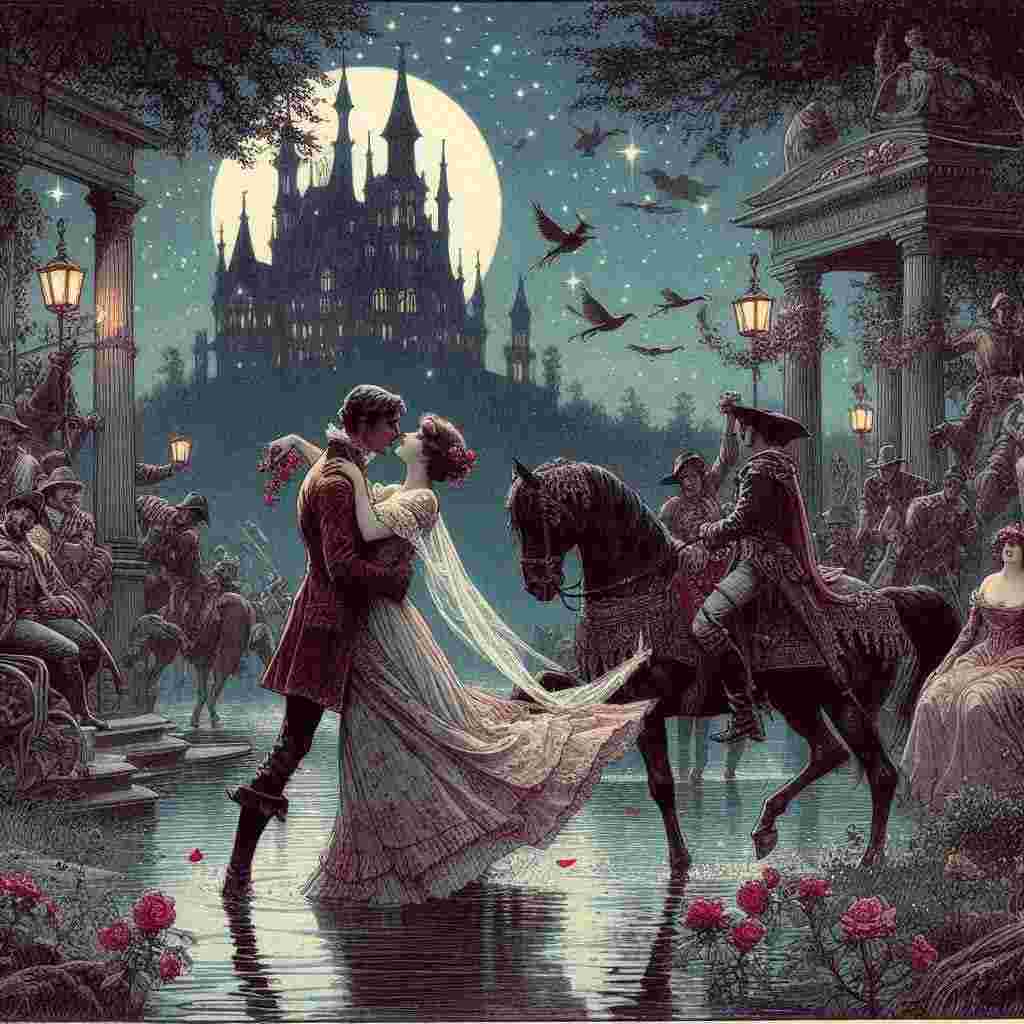Romance
Robert Louis Stevenson
1850 to 1894

Want to track your favorites? Reopen or create a unique username. No personal details are required!
I will make you brooches and toys for your delight
Of bird-song at morning and star-shine at night.
I will make a palace fit for you and me
Of green days in forests and blue days at sea.
I will make my kitchen, and you shall keep your room,
Where white flows the river and bright blows the broom,
And you shall wash your linen and keep your body white
In rainfall at morning and dewfall at night.
And this shall be for music when no one else is near,
The fine song for singing, the rare song to hear!
That only I remember, that only you admire,
Of the broad road that stretches and the roadside fire.
Robert Louis Stevenson's Romance
Robert Louis Stevenson's poem "Romance" presents a vivid and idealistic portrayal of love, blending natural imagery with domestic aspirations to create a dreamlike vision of a shared life. Through its carefully crafted structure and evocative language, the poem explores themes of devotion, harmony with nature, and the intimate connection between lovers.
The poem is composed of three quatrains, each following an AABB rhyme scheme, which lends a musical quality to the verse and reinforces the sense of harmony described within. This structure also mirrors the balanced relationship the speaker envisions, with each couplet representing the two individuals coming together in perfect accord.
Stevenson begins the poem with a promise: "I will make you brooches and toys for your delight." This opening line establishes the speaker's desire to please and provide for their beloved. The use of "brooches and toys" suggests both adornment and playfulness, hinting at a relationship that is both mature and youthful. The speaker's offerings are not material possessions, but rather experiences and moments drawn from nature: "bird-song at morning and star-shine at night." This juxtaposition of day and night imagery creates a sense of completeness, implying that the speaker's love encompasses all aspects of life.
The second quatrain expands on this theme, with the speaker promising to create "a palace fit for you and me." This palace, however, is not a physical structure but a metaphorical one built from shared experiences: "green days in forests and blue days at sea." The use of color imagery here is particularly effective, evoking the vibrancy and variety of their life together. The contrast between the enclosed forest and the open sea suggests a relationship that is both intimate and expansive.
As the poem progresses, the imagery shifts from the grand and romantic to the domestic and practical. The speaker declares, "I will make my kitchen, and you shall keep your room," indicating a division of labor that respects individual space within the shared home. This line also hints at traditional gender roles, with the speaker (presumably male) taking on the role of provider and the beloved (presumably female) maintaining the domestic sphere.
The natural imagery continues in this stanza, with "white flows the river and bright blows the broom." These lines not only paint a picturesque scene but also symbolize purity and renewal. The emphasis on cleanliness and whiteness in the following lines ("you shall wash your linen and keep your body white") further reinforces these themes, suggesting a relationship that is pure and unsullied.
The final quatrain introduces a new element: music. The speaker promises "a fine song for singing, the rare song to hear!" This song is intimate and exclusive, "only I remember, that only you admire," emphasizing the private nature of their love. The mention of "the broad road that stretches and the roadside fire" in the closing line adds a touch of adventure and warmth to their shared journey, suggesting that their love is both expansive and comforting.
Throughout the poem, Stevenson employs a series of future tense statements ("I will make"), creating a sense of anticipation and promise. This technique not only conveys the speaker's commitment but also gives the poem a forward-looking, optimistic tone. The repetition of "I will make" at the beginning of each stanza reinforces the speaker's role as the active creator of this shared life.
The poem's title, "Romance," takes on multiple meanings when considered in the context of the verse. It refers not only to the romantic relationship between the speaker and their beloved but also to the romanticized, idealized nature of the life they envision together. The poem presents a highly aestheticized view of love, one that is deeply intertwined with the natural world and simple pleasures.
In conclusion, "Romance" by Robert Louis Stevenson is a masterful exploration of love and companionship, rendered through vivid natural imagery and domestic details. The poem's structure, language, and themes work together to create a portrait of an idealized relationship that is at once grand and intimate, adventurous and domestic. By grounding this romantic vision in concrete, sensory details, Stevenson creates a poem that is both dreamily aspirational and tantalizingly tangible, inviting readers to imagine their own version of this romantic ideal.
This text was generated by AI and is for reference only. Learn more

